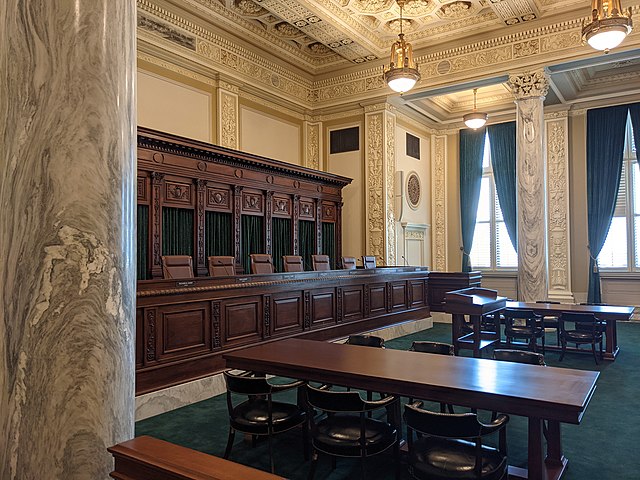Ongoing debates about the highly controversial McGirt v. Oklahoma decision are once again at the forefront of the American justice system. In January of 2022, the Supreme Court agreed to address whether the same restrictions apply to non-natives who commit crimes against permanent inhabitants of reservations across eastern Oklahoma in regards to the case of Victor Manuel Castro-Huerta.
Oklahoma v. Castro-Huerta is the latest petition of nearly 45 that has been brought before the Supreme Court in the past year and a half since the monumental ruling in 2020.
Who is McGirt and why is this case such a big deal?
In 1997, Jimcy McGirt was sentenced to two 500 year sentences and life without parole after being found guilty of first-degree rape of a minor. For over 20 years, this verdict was McGirt’s new reality until Patrick Murphy came along.
In 1999, Patrick Murphy was convicted of murder and sentenced to death. After the ruling Murphy appealed to the Oklahoma Court of Criminal Appeals (OCCA). Given that Murphy was a citizen of the Muscogee nation (also known under colonial naming as the Creek nation) and the crime took place on Muscogee reservation territory, Murphy claimed the state had no jurisdiction over his case per the Major Crimes Act, an act which defines the circumstances in which federal courts would intervene in crimes committed in reservation communities. Lower courts rejected these claims, prompting Murphy to file an appeal with the 10th circuit, a federal court with jurisdiction over Colorado, Kansas, New Mexico, Oklahoma, Utah, and Wyoming. The 10th circuit agreed with Murphy and ordered his conviction to be canceled.
Concerned with how this decision would impact the authority of local law enforcement, Warden Mike Carpenter filed a petition with the Supreme Court claiming that a ruling in favour of Murphy would completely eliminate Oklahoma’s law enforcement authority over the reservation. After hearing this argument the Supreme Court agreed to hear the case in the October 2019-2020 term.
The Supreme Court’s willingness to hear Murphy’s case encouraged McGirt, who himself is a member of the Seminole nation (also colonially understood to be Creek) and committed the crimes within the boundaries of the Muscogee nation, to petition his own case in 2018. In 2020, the court agreed to hear the questions surrounding McGirt’s case.
On July 9, 2020, the Supreme Court reversed the decision of the Oklahoma Court of Criminal Appeal with a 5 to 4 ruling, maintaining that the land in eastern Oklahoma did fall within the bounds of Native American reservations, therefore McGirt’s conviction was revoked. The full opinion of each justice is available here. The court never scheduled further arguments for Sharp v. Murphy, instead making a per curiam ruling based on the reasons stated in McGirt v. Oklahoma, eventually revoking Murphy’s own conviction on the same grounds. The full opinion of the Sharp v. Murphy case is available here. The same day McGirt and Murphy were released, four other convictions were vacated.
Why does this matter?
Although both perpetrators were eventually found guilty for their crimes in retrials in front of a federal court, the monumental decision has created a lot of controversies. Essentially, the decision made in McGirt means that a large portion of land in eastern Oklahoma, 43% to be exact, belongs to the numerous native nations in the area and therefore the state does not hold any jurisdiction to prosecute crimes in the area.

Photo Credits: “Tribal Jurisdiction in Oklahoma” by upln029
Many celebrated the decision as historic in the sense that it not only affirmed the boundaries of the reservation but also confirmed the sovereignty of tribal governments and their inherent right to governance.
Joe Biden, who was a vice president at the time, affirmed this decision stating:
“I am proud to stand with the Muscogee (Creek) Nation and all of Indian Country in celebrating tribal sovereignty and self-determination, which has been denied to them far too long and far too often. It has been an incredible time for a (long overdue) celebration.”
However, others point to the massive strain this decision has placed on tribal and smaller federal courts who remain largely unequipped to handle the influx of violent crime, as well as the trauma many survivors have to go through once again as decades-old cases are brought to retrial.
Oklahoma Attorney General, John M O’Connor claimed “no recent decision of this Court has had a more immediate and destabilizing effect on life in an American State than McGirt v. Oklahoma” on the grounds that shifting jurisdiction had left numerous crimes going unprosecuted and uninvestigated.
Oklahoma Governor Kevin Stitt echoed these claims in 2021, stating McGirt had made Oklahoma a “lawless” land. Another district attorney claimed his office went from handling 350 felonies a year to 17.
However, tribal courts remain optimistic they can handle the newfound authority. The Cherokee Nation recently invested $30 million to expand their own criminal justice system and other nations are quickly following suit.
Although the justices have not accepted petitions to address overturning their earlier decision, the act was recently determined to not be retroactive, which means the decision cannot be applied to older cases. This has significantly reduced the number of cases that initially qualified for retrial. This latest move will continue to refine the limitations of the decisions and, hopefully, curtail some of the ongoing debates.
For more information from both sides please visit the sites below:
- FAQs on McGirt answers by the attorney general of Oklahoma here
- The Chickasaw Nations statement on the decision here
Edited by Mehak Balwani
Image credits:
Upln029. “TRIBAL JURISDICTIONS IN OKLAHOMA.” OKLAHOMA DEPARTMENT OF TRANSPORTATION. PLANNING & RESEARCH DIVISION, 24 June 2013, www.ok.gov/health2/documents/map_tribal_jurisdictions.pdf. Accessed 2022.
Emily is in her third year at McGill University majoring in Political science with minors in social entrepreneurship and international development.

